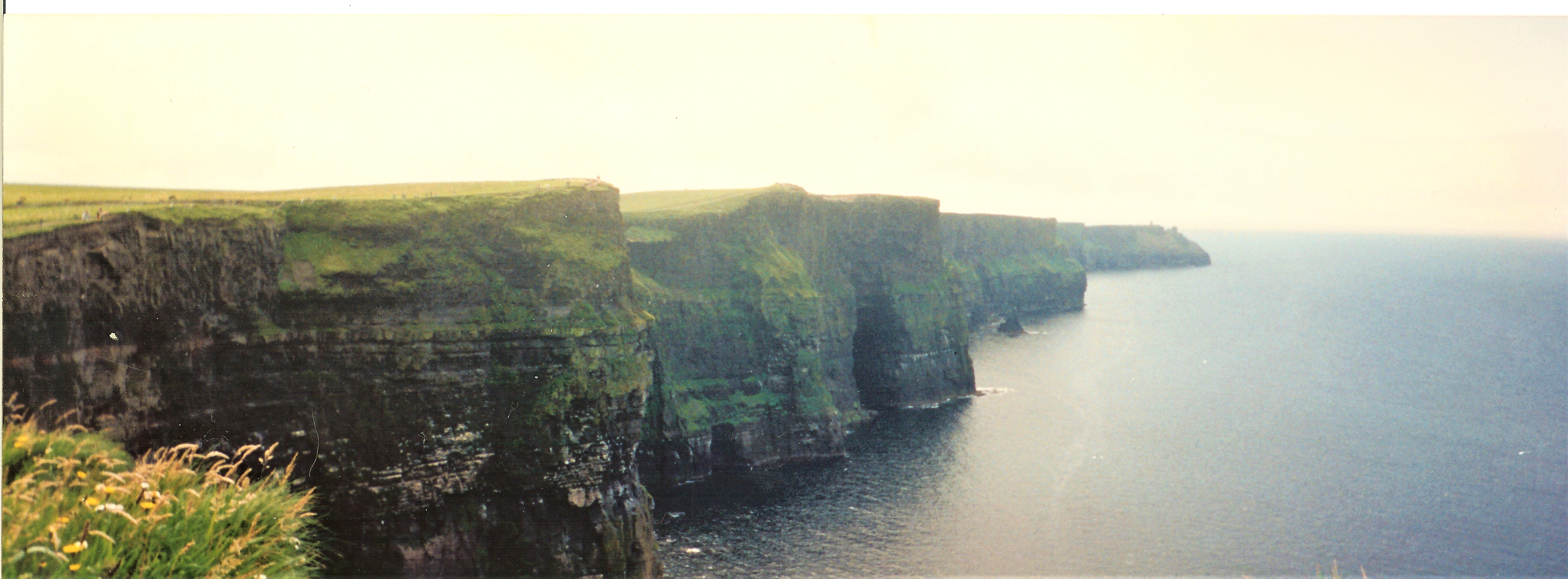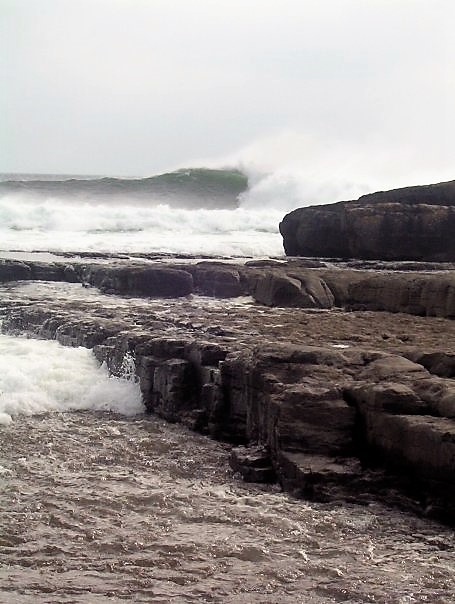“Fish, fish, fish,” says Tomas, as he dangles a fishing line over the side of his small, white boat and into the Atlantic Sea. He gives the line a wiggle, throws a wink to me sitting up at the bow, and repeats the magic charm. Me and my friend Angela, balanced on the edge of the boat at the stern, wait in silence and watch the line.
Nothing. Not even the mirage of a tug. “Sometimes it works,” says Tomas with a sheepish smile. But today the fish aren’t buying any Irish charms.
Angela and I are lucky, even if we have been out on the water half an hour without catching anything. Not only are we getting a private tour with a local around Inis Oirr—the smallest of the three Aran Islands that lurk off the west coast of Ireland—we’re also getting a lesson in fishing superstitions of the islanders.


Angela and I are working for the summer in Inis Oirr’s only hotel—a small, family-run place with 15 rooms, but no Room 13. Instead, the numbering goes 11, 12A, 12B, 14…. On a day off we’ve finally managed to nag Tomas, a local fisherman and friend, into taking us out in his boat. It’s an adventure I’ve been after since working here the summer before, but with little luck—and luck is just the problem. Western Ireland abounds with superstitions about red-headed women, an unfortunate club to which I belong. Sure enough, the fishermen of Inis Oirr think no good can come from bringing a ginger woman out in the boat. I’ve already been blamed for one fishing mishap. A couple weeks ago two brothers took me out in their boat for a short spin one morning to check their nets, only to find their motor broken down later that same day. “Can’t figure out what’s wrong with it,” one of the brothers said to me, his eyes taking on a glint of suspicion as they drifted off my face to my strawberry blonde locks. “It was working fine when we took you out a few hours ago.”
But Tomas either has more confidence in me or less in the power of superstitions. Perhaps it’s because he and another fisherman took me out on the sea on a previous occasion, with some actual success. Or maybe it’s because he’s heard I’m really a brunette who colors her hair. In any case he agreed to meet Angela and I at the slip by the beach this afternoon, and now for the first time we’re really fishing—and not just along for the ride.
He’s steered the boat to places on the sea where the seagulls have been circling overhead and floating along with the waves. “Look for the birds. That’s where the fish are,” he tells us. Once he stops the motor, he takes up the oars and rows us out a little farther and then lets Angela and I have a go at the fish. We use a long line with a small weight at one end and several bait hooks. More than once I get excited when I think I feel a tug on the line, only to have Tomas take the line and tell me it’s got caught in the rocks underwater. Angela, meanwhile, becomes more interested in steering than fishing. Tomas restarts the motor and lets her guide us where the sea is deeper, where there’s less chance of our line getting caught up in rocks, and where we can see puffins bobbing on the water. There’s a large colony of them living amongst the cracks and crags of the mighty, moss-covered Cliffs of Moher, just a few miles from Inis Oirr on the mainland. Today is a classic Irish summer’s day—some sunshine, some clouds, some gray skies, some blue—but the wall of the cliffs is so massive that even the gray moments can’t dull the bright green of the cliffs. From the edge of Inis Oirr the cliffs look like a giant green flag, rippled by the wind.

When Angela stops the boat, Tomas pulls out another Irish charm for fishing. “Has anyone been to mass lately?” he asks us. Angela hasn’t been in ages. I’m a hit-or-miss mass-goer myself, but I did make it out of bed to the island’s one small church a couple Sundays ago. “I’d say we’ll have some luck so,” says Tomas and hands the line over to me.
Sure enough, in a few minutes I’m feeling a tug—the real deal. Tomas helps me pull up the line, where a pollock has met its fate. I snap a picture of Tomas holding up my prize. Angela takes the line then for a short while and lands a tiny baby of a fish, not much longer than a cigarette. Before throwing the baby back into the sea, Tomas shouts, “Photo! Photo! Get the camera!” “Well I caught one anyway,” says Angela, not able to hold back a proud smile.
Tomas lets Angela console herself by taking over the steering again. We end up going for a trip around the whole island, only 4 square miles and nearly all limestone, just a big floating chunk of the stuff. The day brightens as we pass around the coast of the island where, across from the Cliffs of Moher, an old, hulking wrecked freighter rests—The Plassey, stuck there since a bad storm in 1960. We go on past a lighthouse and the uninhabited back of the island, where the sea has pounded and eaten away Inis Oirr’s limestone into large, step-like columns and slabs fit for a giant’s tread.


Three-quarters around now, the island’s coast is all tumbled-down boulders. I spot a small, rusted vessel marooned on the rocks. Tomas says it’s a boat that drifted up onto the island during World War II. Inside was the body of an American soldier, never identified. His grave is a little farther inland from where his boat landed. The islanders buried him there, not far from a holy well, or natural spring, dedicated to the Aran Islands’ patron saint, Enda. “Why didn’t the islanders bury him in the cemetery?” I ask. All of Inis Oirr’s other dead lie in a graveyard built around the remains of an old church on a high dune off the beach. Tomas explains that since the islanders didn’t know who he was, they had no way of knowing whether he was Catholic or even Christian and didn’t want to risk burying a “heathen soul” in consecrated ground.
When we get around to the front of the island, Tomas takes over the steering and guides the boat past the pier and up to the beach. He gets out of the boat—his feet protected from the waves running up to shore by a pair of wellies—and pulls it up onto the sand. Angela, in bare feet, leaps from the boat onto the shore. I’m more hesitant, worried about getting my shoes and socks soaked. Tomas notices, tells me to wait where I am, and wades over to lift me out and carry me farther up shore where I’m safe from getting wet. He then takes our big haul of one pollock, guts it for us, and washes it clean in the sea. Even with that head start it will take Angela and I, city girls both, a Dubliner and a Chicagoan, well over half an hour to figure out how to further dress the fish for dinner.

In the evening, after a feast of fresh pollock, potatoes, and carrots, Angela and I meet Tomas in the hotel pub to hear the locals play traditional music. Tomas has beaten us to the chase for rounds and already bought us each a drink. But once that round is nearly done, I run up to the bar to buy a pint for Tomas. “That’s for carrying me out of the boat today,” I tell him, setting the pint down in front of him. For a moment he looks politely modest and surprised. Then he reaches behind his back and fakes a look of agony. “How about paying the doctor’s bill for me broken back?” He beats us to laughing at his own joke. Then the music starts up and drowns out any more jokes and laughs. It’s been a lucky day.